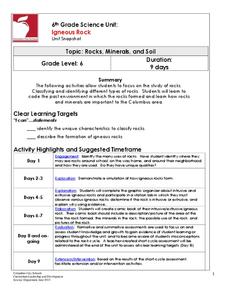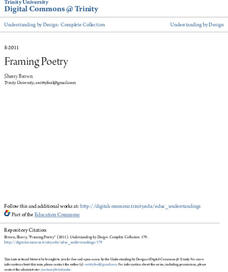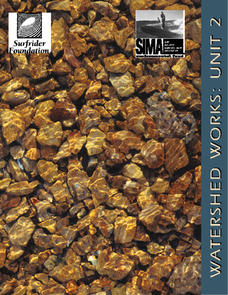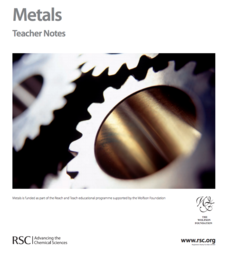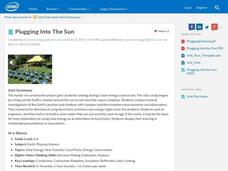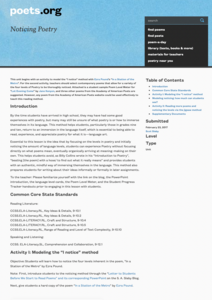Cornell Lab of Ornithology
Amazing Birds
What's so amazing about birds? Find out just how amazing birds are with a physics of animal behavior unit created by Cornell Lab of Ornithology. Have learners explore and tap into their observational skills and notice how birds fly, what...
Columbus City Schools
Igneous Rock
These rocks are HOT! Well, they used to be, anyway. Take young geologists on a two-week journey through the life and times of the average igneous rock. Lab groups work together to hypothesize about intrusive and extrusive igneous...
PBS
Blow the Roof Off!
Blow the minds of young scientists with this collection of inquiry-based investigations. Based on a series of eight videos, these "hands-on, minds-on" science lessons engage young learners in exploring a wide range of topics...
Houghton Mifflin Harcourt
Around Town: Neighborhood and Community: Challenge Activities (Theme 3)
Here is a unit consisting of activities designed to challenge your scholars. The extended learning opportunities include planning a celebration, making a presentation to the class, poster making, writing poetry, a problem-solving...
Trinity University
Framing Poetry
The big idea in this poetry unit plan is that structure and content work together to create meaning. Class members learn how to identify and mark the metrical patterns and line lengths used in poems. They study the structure of various...
BioEd Online
Spiders in Space
Does a spider spin its web differently in space? What other ways might microgravity affect an arachnid? Pick a topic to research, plan an investigation, and follow astronauts on the International Space Station as they perform some of the...
BioEd Online
Butterflies in Space
How does gravity affect the life cycle of a butterfly? Learn first-hand what types of investigations astronauts perform in space by following along with one of NASA's experiments. Create butterfly habitats in the classroom with specific...
Royal Society of Chemistry
Equilibria—Gifted and Talented Chemistry
Teaching is a balancing act! Keep things on an even keel with a comprehensive equilibrium lesson plan. The resource covers reversible and irreversible reactions, Le Chatelier's Principle, and the industrial applications of equilibrium...
National Library of Medicine
Electricity, Frankenstein, and the Spark of Life
Shocking! After viewing a short clip from the 1931 movie, Frankenstein and reviewing electricity references in Mary Shelley's novel, class members examine Luigi Galvani's and Alessandro Volta's observations on electricity and muscle...
Curated OER
Watershed Works: Unit 2
The second of a three-unit lesson plan, this focuses on how human-made structures affect watersheds. Using watershed models that were built during the first unit, junior geologists now place buildings, dams, or levees into the models and...
Intel
Starquest
Almost every ancient culture observed the stars and saw pictures in the patterns. Studying stars allowed them to guide travelers, determine when to plant crops, when to harvest food, and the stories surrounding the images include some of...
Curated OER
Darwin’s Bees
What do you call a bee born in May? A maybe! This first instructional activity in a series of four begins with a starter activity to get scholars thinking about the topic. Then a circus, or circuit of seven activities,...
Royal Society of Chemistry
Metals—Gifted and Talented Chemistry
Malleable, magnetic, mesmerizing metals! Pupils love learning about metallic elements, especially through the hands-on activities in an engaging lesson plan. The resource provides thorough instruction on the properties of metals, the...
Curated OER
Watershed Works: Unit 3
Geology whizzes observe the effects of change within a model of a watershed. They place replica waste dumps within the models and note the path that the waste takes as water passes through. This detailed lesson plan provides teacher...
Intel
Forensics: Get a Clue
Although the methods are all scientific, forensic science was started by police officers rather than scientists, who relied on observation and common sense. Young detectives use many tools to solve crimes around the school in a...
Intel
Plugging into the Sun
What's cooking? A sizzling STEM unit challenges scholars to build a solar cooker that can successfully cook an egg. The unit opens with a study of Earth's rotation, the sun's energy, and shadows. Pupils use a compass and thermometer to...
Curated OER
Ladybugs, Ladybugs, Ladybugs
Those lovely ladybugs are so cute, and so very useful! Use a short unit to explore insect anatomy, the ladybug life cycle, and the help ladybugs provide organic farmers. The unit is comprised of four short thirty-minute lesson plans that...
Echoes & Reflections
Jewish Resistance
Resistance to the Holocaust took on many forms. Learners explore the passive and active resistance of Jewish people who continued their practices and observances, as well as organized resistance against the evils of the Nazis. An...
Academy of American Poets
Noticing Poetry
Introduce scholars to the "I Notice" method, a different approach to studying poetry. Instructors first model the noticing method by identifying words and images that appeal on the sonic level, the ideational level, the sensory level,...
Core Knowledge Foundation
First Grade Skills Unit 5
Twenty-two lessons make up a unit that focuses on first-grade skills. Scholars examine spelling alternatives—their rules and patterns, practice tricky spelling and high-frequency words, explore plural nouns and sentences, read a...
Core Knowledge Foundation
Unit 9: The Science of Breakable Things by Tae Keller
A novel study examines The Science of Breakable Things by Tae Keller. Fifth graders participate in daily readings, discussions, and assignments following an "ask, explore, imagine, observe, and understand" routine. A final performance...
Curated OER
Unit Plan for The Catcher in the Rye —A “Place-Based” Approach
"People never notice anything." As part of their study of The Catcher in the Rye, class members adopt Holden Caulfield's approach and spend time as quiet observers of their surrounding, recording their observations/reflections in a...
Curated OER
Earthquakes: Sixth Grade Lesson Plans and Activities
Young seismologists learn more about plate tectonics with a set of pre-lab, lab, and post-lab lessons plans on earthquakes. After exploring how waves travel through various materials, sixth graders record their observations and...
Georgia Standards
Sociology Unit Six: Socialization Within the Group
How do we learn the rules of society? How do beliefs and ideas affect these rules? Introduce your young sociologists to the factors that socialize individuals with a unit that uses observation and experimentation to analyze how factors...
Other popular searches
- Observe Physical Properties
- Observe the Night Sky
- Scientific Process Observe
- Predict Observe Explain
- Observe Stomata
- Observe and Infer
- 5 Senses to Observe
- Observe and Classify
- Fire Drill Observe
- Observe Fungus
- Cooperative Observer Network
- Observed Change

